Analyzing the Dynamics of Foreign Policy in International Relations
VerifiedAdded on 2023/05/30
|5
|1087
|320
Essay
AI Summary
This essay explores the intricate relationship between foreign policy and international relations, highlighting how national interests, historical events, and international influences shape a nation's foreign policy strategies. It addresses the contentious nature of foreign policy, examining debates at national and global levels. The essay references scholars like Hill, Acharya, and Smith, discussing the marginalization of non-Western perspectives in international relations discourse and the dominance of Western ideologies. It argues that while Western influence has significantly shaped foreign policies globally, there's a need for inclusivity and recognition of diverse contributions to foster justice and democracy in international relations. The essay also touches on the internal struggles within Western regions regarding the shaping of international relations and the impact of rationalism on exporting policy agendas.
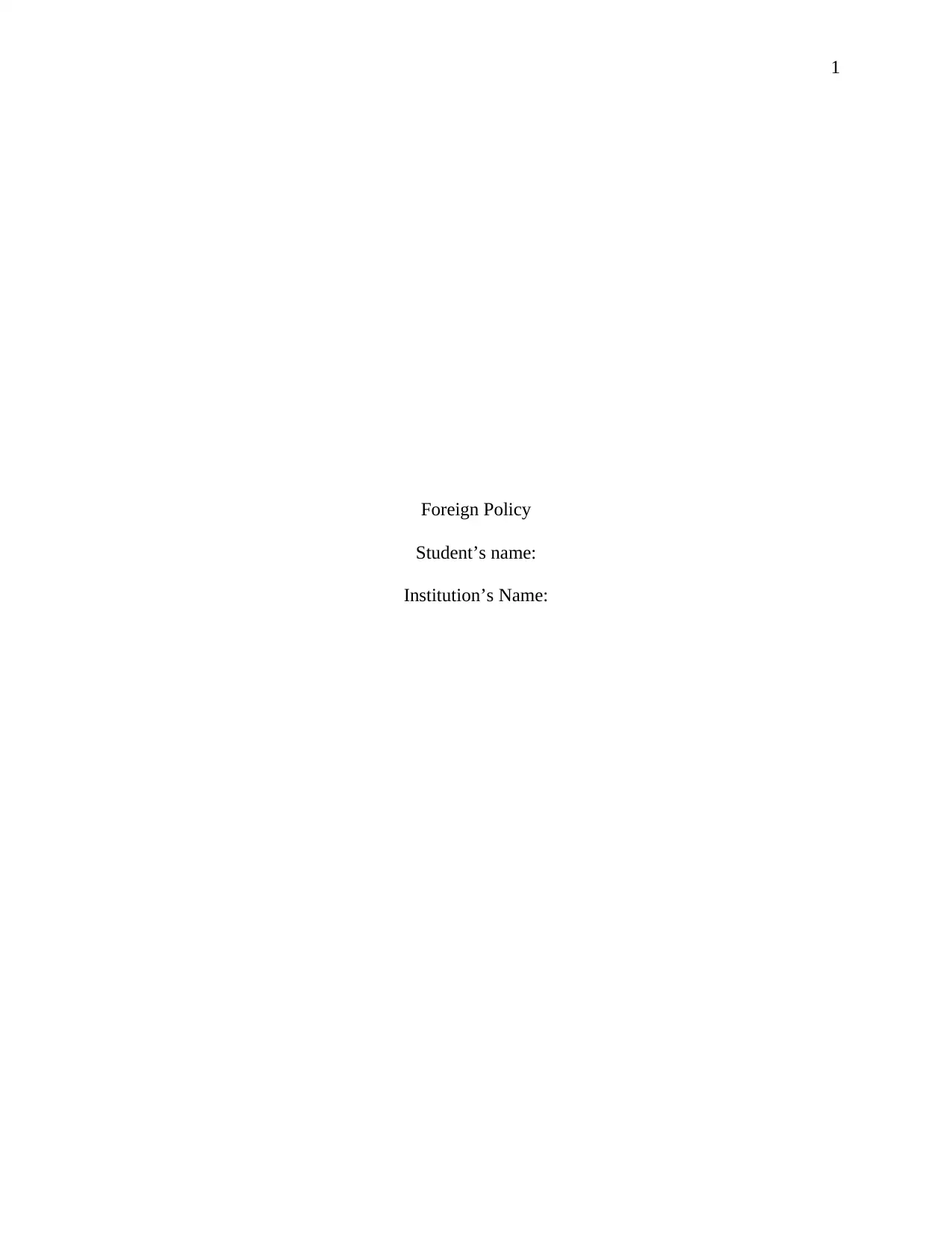
1
Foreign Policy
Student’s name:
Institution’s Name:
Foreign Policy
Student’s name:
Institution’s Name:
Paraphrase This Document
Need a fresh take? Get an instant paraphrase of this document with our AI Paraphraser
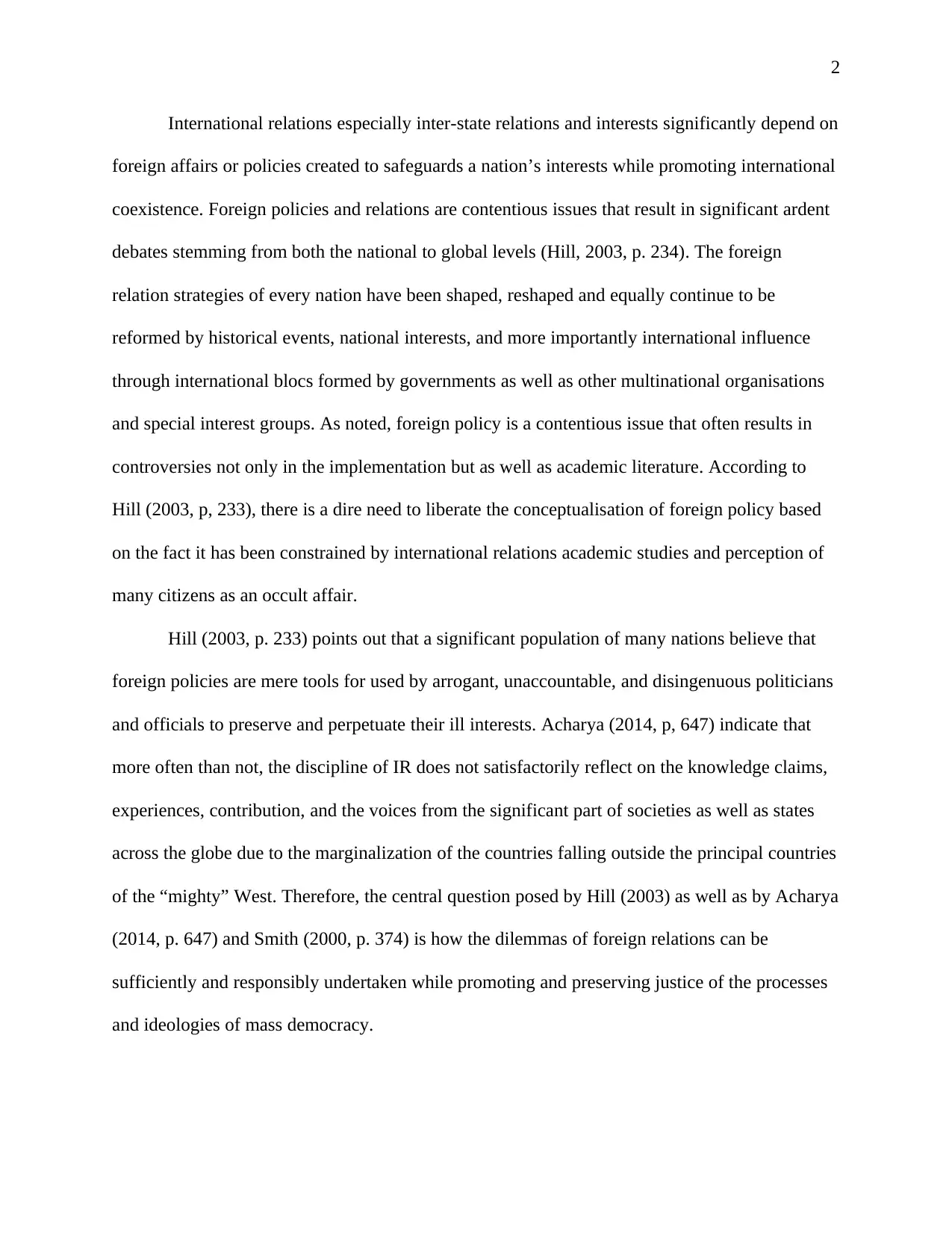
2
International relations especially inter-state relations and interests significantly depend on
foreign affairs or policies created to safeguards a nation’s interests while promoting international
coexistence. Foreign policies and relations are contentious issues that result in significant ardent
debates stemming from both the national to global levels (Hill, 2003, p. 234). The foreign
relation strategies of every nation have been shaped, reshaped and equally continue to be
reformed by historical events, national interests, and more importantly international influence
through international blocs formed by governments as well as other multinational organisations
and special interest groups. As noted, foreign policy is a contentious issue that often results in
controversies not only in the implementation but as well as academic literature. According to
Hill (2003, p, 233), there is a dire need to liberate the conceptualisation of foreign policy based
on the fact it has been constrained by international relations academic studies and perception of
many citizens as an occult affair.
Hill (2003, p. 233) points out that a significant population of many nations believe that
foreign policies are mere tools for used by arrogant, unaccountable, and disingenuous politicians
and officials to preserve and perpetuate their ill interests. Acharya (2014, p, 647) indicate that
more often than not, the discipline of IR does not satisfactorily reflect on the knowledge claims,
experiences, contribution, and the voices from the significant part of societies as well as states
across the globe due to the marginalization of the countries falling outside the principal countries
of the “mighty” West. Therefore, the central question posed by Hill (2003) as well as by Acharya
(2014, p. 647) and Smith (2000, p. 374) is how the dilemmas of foreign relations can be
sufficiently and responsibly undertaken while promoting and preserving justice of the processes
and ideologies of mass democracy.
International relations especially inter-state relations and interests significantly depend on
foreign affairs or policies created to safeguards a nation’s interests while promoting international
coexistence. Foreign policies and relations are contentious issues that result in significant ardent
debates stemming from both the national to global levels (Hill, 2003, p. 234). The foreign
relation strategies of every nation have been shaped, reshaped and equally continue to be
reformed by historical events, national interests, and more importantly international influence
through international blocs formed by governments as well as other multinational organisations
and special interest groups. As noted, foreign policy is a contentious issue that often results in
controversies not only in the implementation but as well as academic literature. According to
Hill (2003, p, 233), there is a dire need to liberate the conceptualisation of foreign policy based
on the fact it has been constrained by international relations academic studies and perception of
many citizens as an occult affair.
Hill (2003, p. 233) points out that a significant population of many nations believe that
foreign policies are mere tools for used by arrogant, unaccountable, and disingenuous politicians
and officials to preserve and perpetuate their ill interests. Acharya (2014, p, 647) indicate that
more often than not, the discipline of IR does not satisfactorily reflect on the knowledge claims,
experiences, contribution, and the voices from the significant part of societies as well as states
across the globe due to the marginalization of the countries falling outside the principal countries
of the “mighty” West. Therefore, the central question posed by Hill (2003) as well as by Acharya
(2014, p. 647) and Smith (2000, p. 374) is how the dilemmas of foreign relations can be
sufficiently and responsibly undertaken while promoting and preserving justice of the processes
and ideologies of mass democracy.
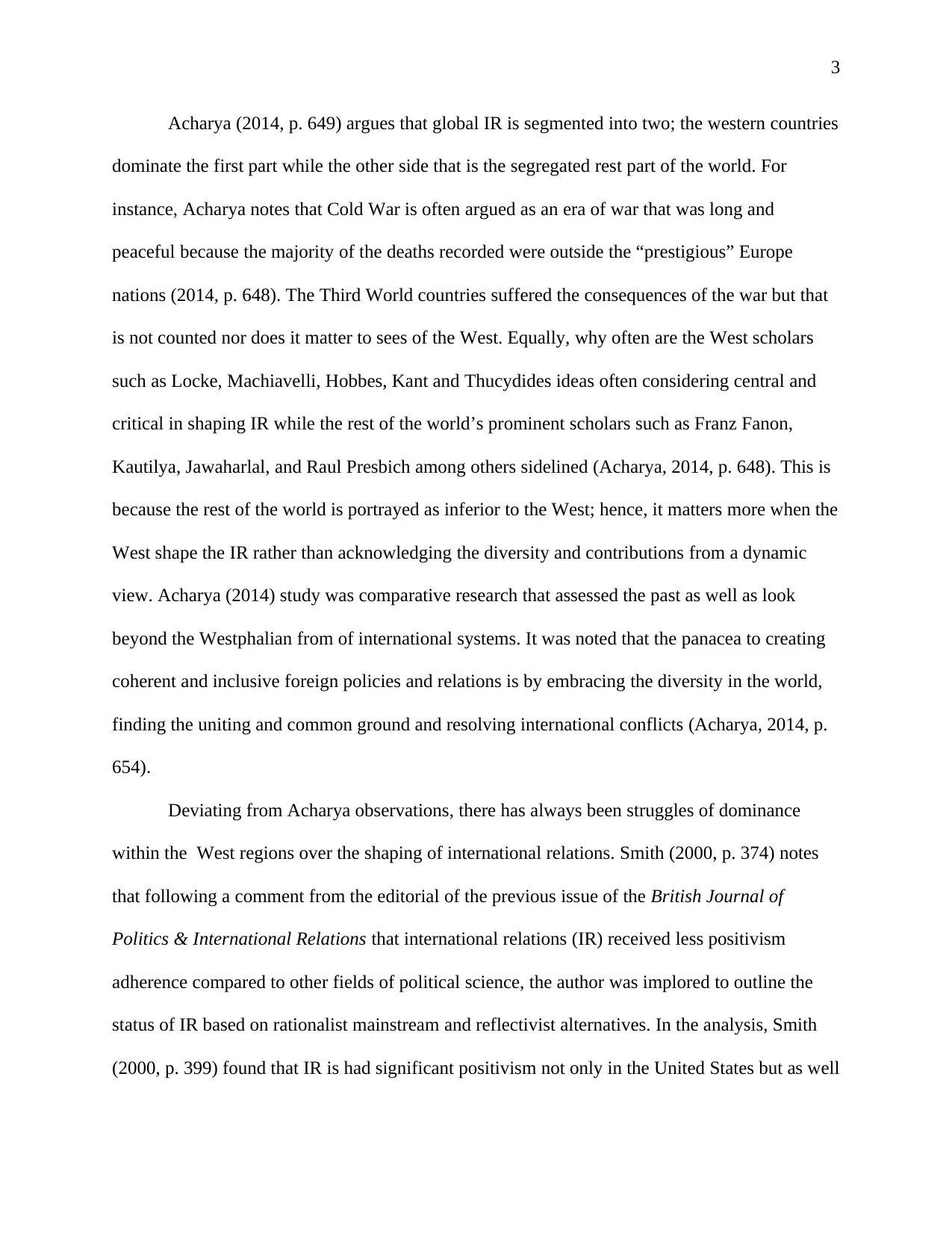
3
Acharya (2014, p. 649) argues that global IR is segmented into two; the western countries
dominate the first part while the other side that is the segregated rest part of the world. For
instance, Acharya notes that Cold War is often argued as an era of war that was long and
peaceful because the majority of the deaths recorded were outside the “prestigious” Europe
nations (2014, p. 648). The Third World countries suffered the consequences of the war but that
is not counted nor does it matter to sees of the West. Equally, why often are the West scholars
such as Locke, Machiavelli, Hobbes, Kant and Thucydides ideas often considering central and
critical in shaping IR while the rest of the world’s prominent scholars such as Franz Fanon,
Kautilya, Jawaharlal, and Raul Presbich among others sidelined (Acharya, 2014, p. 648). This is
because the rest of the world is portrayed as inferior to the West; hence, it matters more when the
West shape the IR rather than acknowledging the diversity and contributions from a dynamic
view. Acharya (2014) study was comparative research that assessed the past as well as look
beyond the Westphalian from of international systems. It was noted that the panacea to creating
coherent and inclusive foreign policies and relations is by embracing the diversity in the world,
finding the uniting and common ground and resolving international conflicts (Acharya, 2014, p.
654).
Deviating from Acharya observations, there has always been struggles of dominance
within the West regions over the shaping of international relations. Smith (2000, p. 374) notes
that following a comment from the editorial of the previous issue of the British Journal of
Politics & International Relations that international relations (IR) received less positivism
adherence compared to other fields of political science, the author was implored to outline the
status of IR based on rationalist mainstream and reflectivist alternatives. In the analysis, Smith
(2000, p. 399) found that IR is had significant positivism not only in the United States but as well
Acharya (2014, p. 649) argues that global IR is segmented into two; the western countries
dominate the first part while the other side that is the segregated rest part of the world. For
instance, Acharya notes that Cold War is often argued as an era of war that was long and
peaceful because the majority of the deaths recorded were outside the “prestigious” Europe
nations (2014, p. 648). The Third World countries suffered the consequences of the war but that
is not counted nor does it matter to sees of the West. Equally, why often are the West scholars
such as Locke, Machiavelli, Hobbes, Kant and Thucydides ideas often considering central and
critical in shaping IR while the rest of the world’s prominent scholars such as Franz Fanon,
Kautilya, Jawaharlal, and Raul Presbich among others sidelined (Acharya, 2014, p. 648). This is
because the rest of the world is portrayed as inferior to the West; hence, it matters more when the
West shape the IR rather than acknowledging the diversity and contributions from a dynamic
view. Acharya (2014) study was comparative research that assessed the past as well as look
beyond the Westphalian from of international systems. It was noted that the panacea to creating
coherent and inclusive foreign policies and relations is by embracing the diversity in the world,
finding the uniting and common ground and resolving international conflicts (Acharya, 2014, p.
654).
Deviating from Acharya observations, there has always been struggles of dominance
within the West regions over the shaping of international relations. Smith (2000, p. 374) notes
that following a comment from the editorial of the previous issue of the British Journal of
Politics & International Relations that international relations (IR) received less positivism
adherence compared to other fields of political science, the author was implored to outline the
status of IR based on rationalist mainstream and reflectivist alternatives. In the analysis, Smith
(2000, p. 399) found that IR is had significant positivism not only in the United States but as well
⊘ This is a preview!⊘
Do you want full access?
Subscribe today to unlock all pages.

Trusted by 1+ million students worldwide
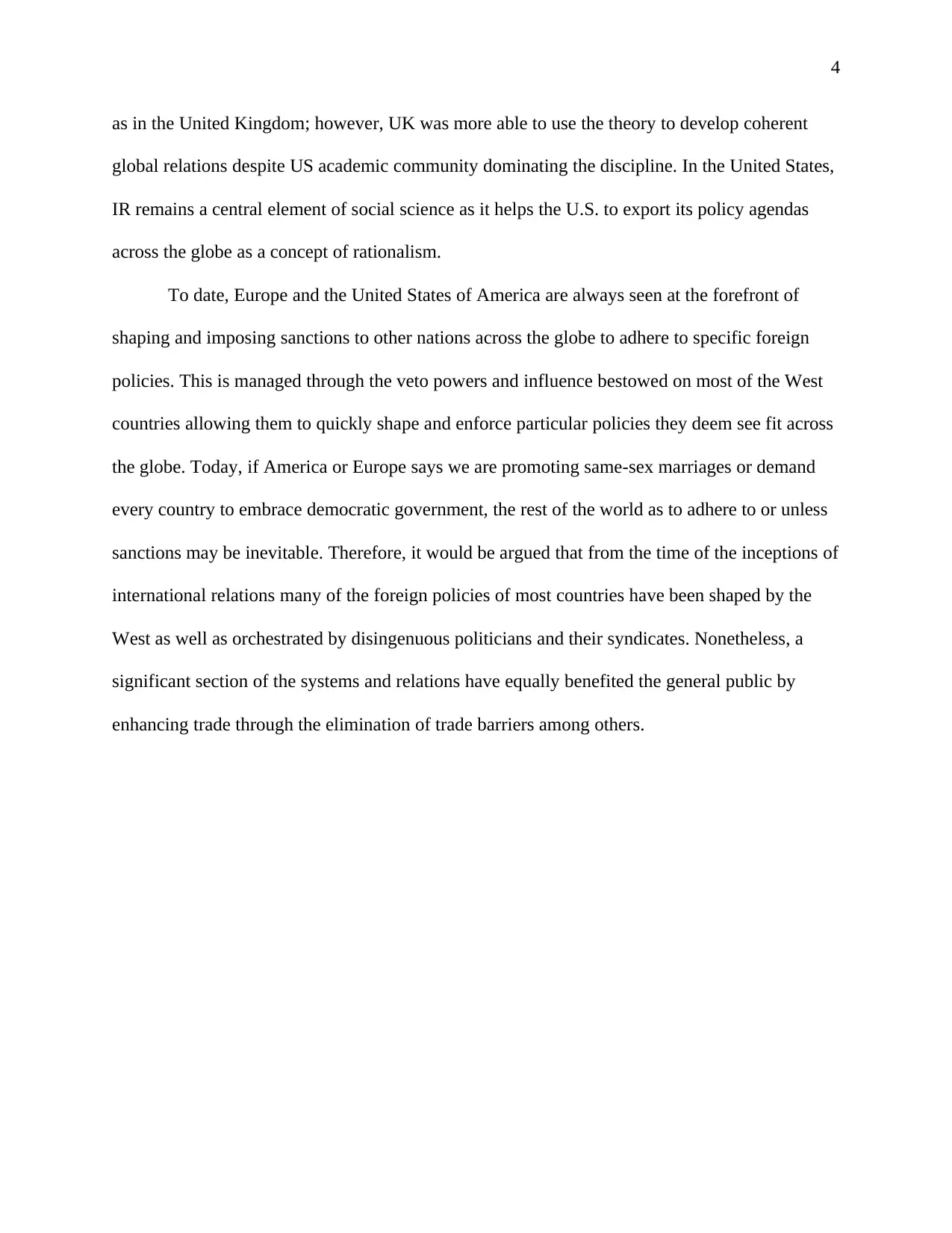
4
as in the United Kingdom; however, UK was more able to use the theory to develop coherent
global relations despite US academic community dominating the discipline. In the United States,
IR remains a central element of social science as it helps the U.S. to export its policy agendas
across the globe as a concept of rationalism.
To date, Europe and the United States of America are always seen at the forefront of
shaping and imposing sanctions to other nations across the globe to adhere to specific foreign
policies. This is managed through the veto powers and influence bestowed on most of the West
countries allowing them to quickly shape and enforce particular policies they deem see fit across
the globe. Today, if America or Europe says we are promoting same-sex marriages or demand
every country to embrace democratic government, the rest of the world as to adhere to or unless
sanctions may be inevitable. Therefore, it would be argued that from the time of the inceptions of
international relations many of the foreign policies of most countries have been shaped by the
West as well as orchestrated by disingenuous politicians and their syndicates. Nonetheless, a
significant section of the systems and relations have equally benefited the general public by
enhancing trade through the elimination of trade barriers among others.
as in the United Kingdom; however, UK was more able to use the theory to develop coherent
global relations despite US academic community dominating the discipline. In the United States,
IR remains a central element of social science as it helps the U.S. to export its policy agendas
across the globe as a concept of rationalism.
To date, Europe and the United States of America are always seen at the forefront of
shaping and imposing sanctions to other nations across the globe to adhere to specific foreign
policies. This is managed through the veto powers and influence bestowed on most of the West
countries allowing them to quickly shape and enforce particular policies they deem see fit across
the globe. Today, if America or Europe says we are promoting same-sex marriages or demand
every country to embrace democratic government, the rest of the world as to adhere to or unless
sanctions may be inevitable. Therefore, it would be argued that from the time of the inceptions of
international relations many of the foreign policies of most countries have been shaped by the
West as well as orchestrated by disingenuous politicians and their syndicates. Nonetheless, a
significant section of the systems and relations have equally benefited the general public by
enhancing trade through the elimination of trade barriers among others.
Paraphrase This Document
Need a fresh take? Get an instant paraphrase of this document with our AI Paraphraser
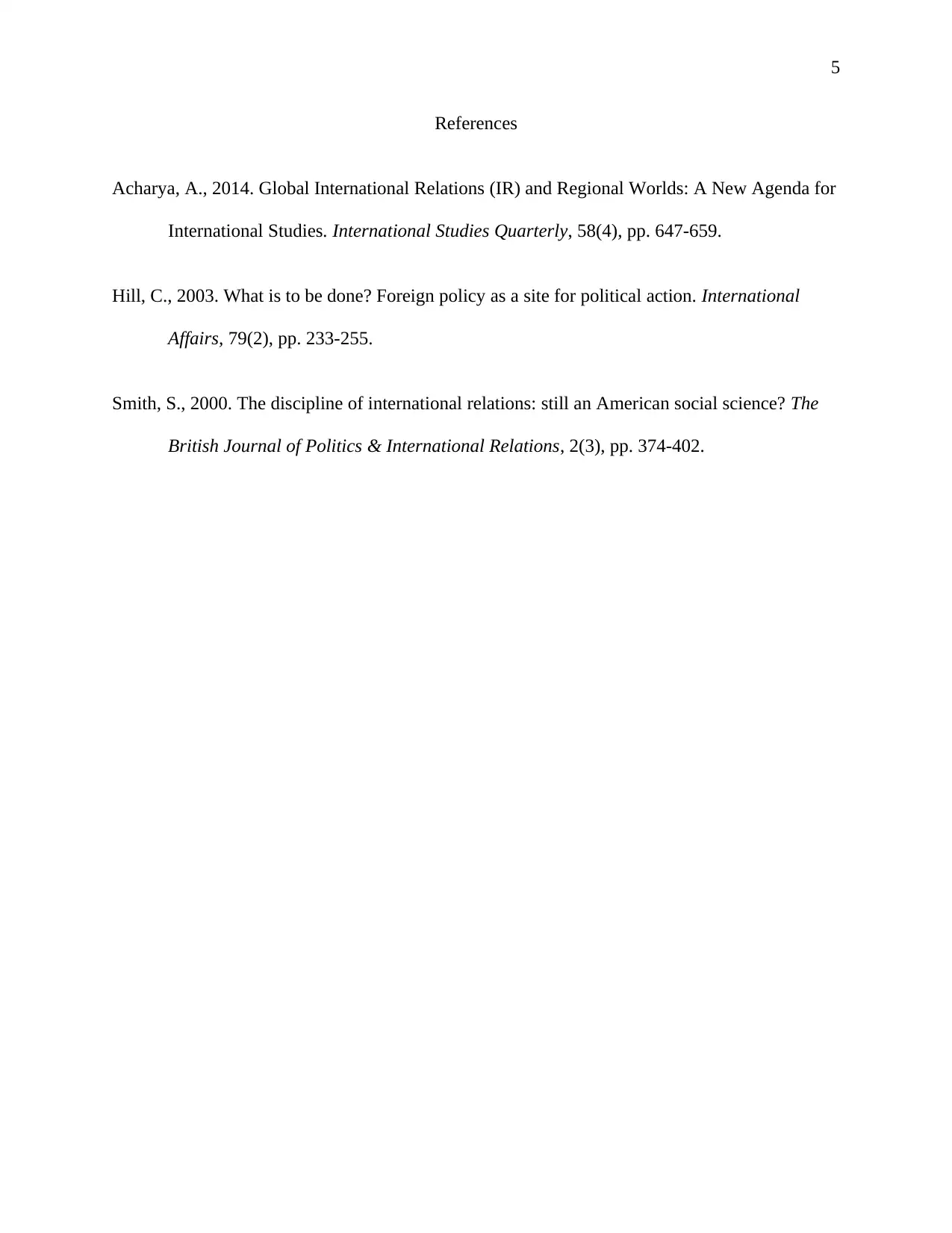
5
References
Acharya, A., 2014. Global International Relations (IR) and Regional Worlds: A New Agenda for
International Studies. International Studies Quarterly, 58(4), pp. 647-659.
Hill, C., 2003. What is to be done? Foreign policy as a site for political action. International
Affairs, 79(2), pp. 233-255.
Smith, S., 2000. The discipline of international relations: still an American social science? The
British Journal of Politics & International Relations, 2(3), pp. 374-402.
References
Acharya, A., 2014. Global International Relations (IR) and Regional Worlds: A New Agenda for
International Studies. International Studies Quarterly, 58(4), pp. 647-659.
Hill, C., 2003. What is to be done? Foreign policy as a site for political action. International
Affairs, 79(2), pp. 233-255.
Smith, S., 2000. The discipline of international relations: still an American social science? The
British Journal of Politics & International Relations, 2(3), pp. 374-402.
1 out of 5
Your All-in-One AI-Powered Toolkit for Academic Success.
+13062052269
info@desklib.com
Available 24*7 on WhatsApp / Email
![[object Object]](/_next/static/media/star-bottom.7253800d.svg)
Unlock your academic potential
Copyright © 2020–2025 A2Z Services. All Rights Reserved. Developed and managed by ZUCOL.
